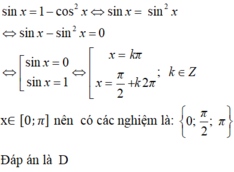

Hãy nhập câu hỏi của bạn vào đây, nếu là tài khoản VIP, bạn sẽ được ưu tiên trả lời.



\(sin^2x-2m.sinx.cosx-sinx.cosx+2mcos^2x=0\)
\(\Leftrightarrow sinx\left(sinx-cosx\right)-2mcosx\left(sinx-cosx\right)=0\)
\(\Leftrightarrow\left(sinx-cosx\right)\left(sinx-2m.cosx\right)=0\)
\(\Rightarrow\left[{}\begin{matrix}sinx=cosx\\sinx=2m.cosx\end{matrix}\right.\)
\(\Rightarrow\left[{}\begin{matrix}tanx=1\\tanx=2m\end{matrix}\right.\)
Do \(tanx=1\) ko có nghiệm đã cho nên \(tanx=2m\) phải có nghiệm trên khoảng đã cho
\(\Rightarrow tan\left(\dfrac{\pi}{4}\right)< 2m< tan\left(\dfrac{\pi}{3}\right)\)
\(\Rightarrow1< 2m< \sqrt[]{3}\)
\(\Rightarrow m\in\left(\dfrac{1}{2};\dfrac{\sqrt{3}}{2}\right)\) (hoặc có thể 1 đáp án là tập con của tập này cũng được)

\(\Leftrightarrow1-2sin^2x+\left(2m-3\right)sinx+m-2=0\)
\(\Leftrightarrow2sin^2x-\left(2m-3\right)sinx-m+1=0\)
\(\Leftrightarrow2sin^2x+sinx-2\left(m-1\right)sinx-\left(m-1\right)=0\)
\(\Leftrightarrow sinx\left(2sinx+1\right)-\left(m-1\right)\left(2sinx+1\right)=0\)
\(\Leftrightarrow\left(2sinx+1\right)\left(sinx-m+1\right)=0\)
\(\Leftrightarrow\left[{}\begin{matrix}sinx=-\dfrac{1}{2}\\sinx=m-1\end{matrix}\right.\)
Pt có đúng 2 nghiệm thuộc khoảng đã cho khi và chỉ khi:
\(\left\{{}\begin{matrix}m-1\ne-\dfrac{1}{2}\\-1\le m-1\le1\end{matrix}\right.\) \(\Leftrightarrow\left\{{}\begin{matrix}m\ne\dfrac{1}{2}\\0\le m\le2\end{matrix}\right.\)

Lời giải:
$\sin (2x+1)=\frac{-1}{2}$
$\Rightarrow 2x+1=\frac{-\pi}{6}+2k\pi$ hoặc $2x+1=\frac{7}{6}\pi +2k\pi$ với $k$ nguyên
Với $2x+1=\frac{-\pi}{6}+2k\pi$
Do $x\in (0;\pi)$ nên $k=1$
$x=\frac{11}{12}\pi -\frac{1}{2}$
Với $2x+1=\frac{7\pi}{6}+2k\pi$
Do $x\in (0;\pi)$ nên $k=0$
$\Rightarrow x=\frac{7}{12}\pi -\frac{1}{2}$

Lê Huy Hoàng:
a) ĐK: $x\in\mathbb{R}\setminus \left\{k\pi\right\}$ với $k$ nguyên
PT $\Leftrightarrow \tan ^2x-4\tan x+5=0$
$\Leftrightarrow (\tan x-2)^2+1=0$
$\Leftrightarrow (\tan x-2)^2=-1< 0$ (vô lý)
Do đó pt vô nghiệm.
c)
ĐK:.............
PT $\Leftrightarrow 1+\frac{\sin ^2x}{\cos ^2x}-1+\tan x-\sqrt{3}(\tan x+1)=0$
$\Leftrightarrow \tan ^2x+\tan x-\sqrt{3}(\tan x+1)=0$
$\Leftrightarrow \tan ^2x+(1-\sqrt{3})\tan x-\sqrt{3}=0$
$\Rightarrow \tan x=\sqrt{3}$ hoặc $\tan x=-1$
$\Rightarrow x=\pi (k-\frac{1}{4})$ hoặc $x=\pi (k+\frac{1}{3})$ với $k$ nguyên
d)
ĐK:.......
PT $\Leftrightarrow \tan x-\frac{2}{\tan x}+1=0$
$\Leftrightarrow \tan ^2x+\tan x-2=0$
$\Leftrightarrow (\tan x-1)(\tan x+2)=0$
$\Rightarrow \tan x=1$ hoặc $\tan x=-2$
$\Rightarrow x=k\pi +\frac{\pi}{4}$ hoặc $x=k\pi +\tan ^{-2}(-2)$ với $k$ nguyên.

điều kiện : cosx\(\ne\)\(\frac{1}{\sqrt{2}}\)=> x\(\ne\)\(\pm\)\(\frac{\pi}{4}\)+2k\(\pi\), k\(\in\)Z
pt<=> tử số =0
<=>cos2x-sin(3x-\(\frac{\pi}{4}\)+x+\(\frac{3\pi}{4}\))-sin(3x-\(\frac{\pi}{4}\)-x-\(\frac{3\pi}{4}\))-2=0
<=> cos2x-sin(x+\(\frac{\pi}{2}\))-sin(2x-\(\pi\))-2=0
<=> cos2x-cosx+sin2x-2sin2x-2cos2x=0
<=>-cos2x-coxs+2sinx.cosx-2sin2x=0
đến đây bạn nhóm lại ra nghiệm rồi kiểm tra đk là xong